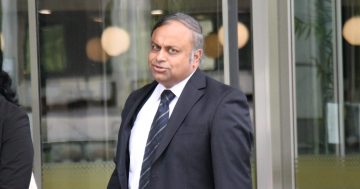
Raminder Singh Kahlon (left) and Abdul “Alex” Aziz El-Debel leave court on Thursday after being found guilty. Photos: Albert McKnight.
After a lengthy trial filled with hours of listening to telephone intercepts, a public servant and a contractor have been found guilty of agreeing to try to defraud the Department of Finance.
Eleven jurors spent three days deliberating before announcing on Thursday (7 July) that they had found Abdul “Alex” Aziz El-Debel and Raminder Singh Kahlon guilty on charges of conspiring with each other and a third man to dishonestly obtain a gain from the Commonwealth between March 2019 and June 2020.
Justice Michael Elkaim thanked the jurors for their efforts through a “long and difficult trial”, continued the two offenders’ bail, ordered pre-sentence reports and adjourned for sentencing in the future.
The pair did not visibly react when the verdicts were read out and their lawyers did not make a comment to the media waiting outside the courthouse.
The verdicts mark the end of the ACT Supreme Court trial that ran for four weeks after starting in early June.
El-Debel, 49, and Kahlon, 38, both pleaded not guilty after they had been accused of influencing the recruitment of potential contractors for the Department of Finance, corrupting the process, along with the third man who was not part of these proceedings.
El-Debel was a public servant in the department who worked as the project manager for the Parliamentary Expenses Management System (PEMS) and the Government Enterprise Resource Planning (GovERP), while the other two men were contractors.
Kahlon’s company Algoram and the third man’s company received contracts from the department to help with important computing projects. They had been asked to obtain contractors to carry out computing jobs.
In the closing submissions from Crown Prosecutor David Staehli SC, he said the three men did not try to install their “dingbats” into the department but contractors with the requisite qualifications.
The court heard there was a difficult work environment, people were under pressure to finish projects, there were staffing issues and the recruitment process was necessary.
Mr Staehli said “the opportunity was taken in those circumstances”; the opportunity to create a gain arose from how the department paid contractors substantial amounts of money.
Many contractors were paid over $200,000, while one asked for $3100 a day.
A company that successfully put forward a contractor had the opportunity to take a margin or “cut” from the appointment, Mr Staehli said. Even if the margins were small, they added up.
Mr Staehli also said one telephone call played to jurors showed El-Debel was “all about his margin”. He said the conversation was about how El-Debel was to get a margin by the recruitment of contractors put forward by the companies linked to Kahlon and the third man.
When Kahlon’s barrister Matthew Kalyk gave his closing submissions, he argued if a candidate put forward by his client was selected by the department, it was because the department had chosen that candidate as the most suitable for the role.
He said if this happened, a contract would be instigated and Kahlon was entitled to funds from that contract.
Jurors listened to eight days of telephone intercepts during the trial, with the court also being told that out of about 60,000 intercepts collected on El-Debel, only 60 were included in the brief of evidence.
“Conspiracy is an agreement to do something illegal,” Mr Staehli said.
“That agreement, the conspiracy, does not have to be something that is written down.”














I was a bit on the fence about Ms Lee's ability to forcely take on the government, and sell the… View